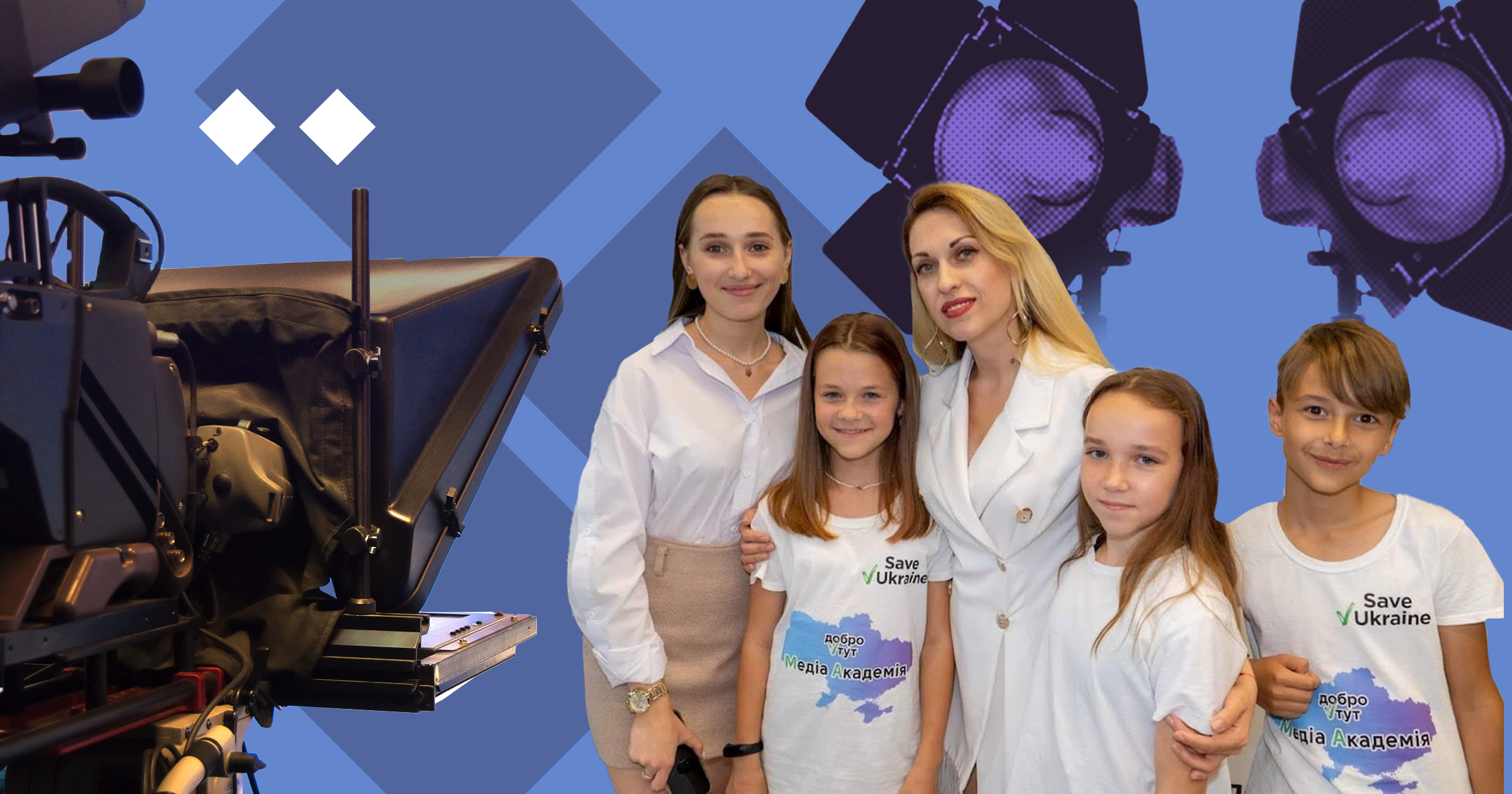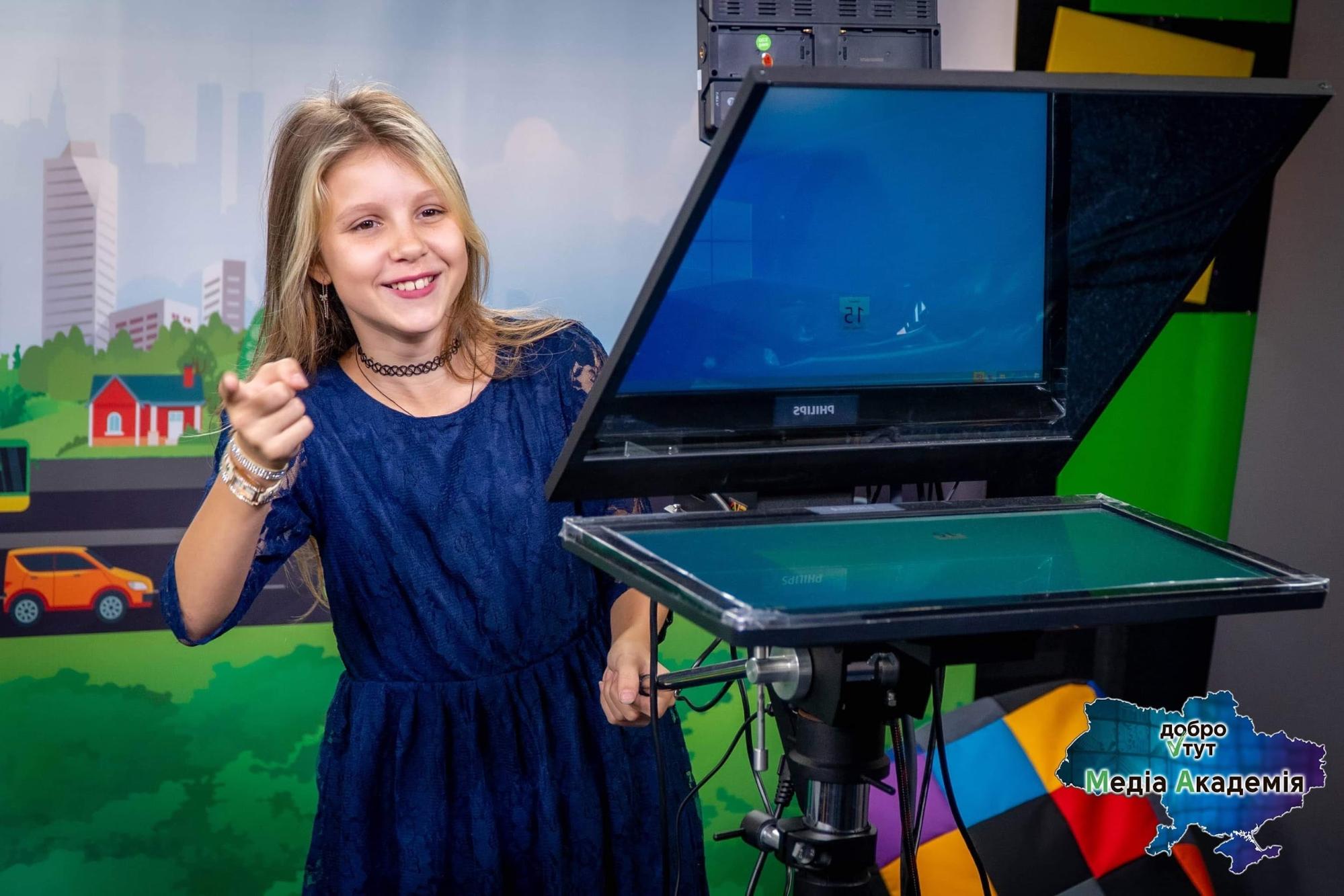This project is more than about learning. It is about how to find new friends in a new place and feel at home again. Rubryka spoke with Anastasia Staroskoltseva, the project head, about the initiative's activity.


Thousands of Ukrainian internally displaced families are starting their lives from scratch because of the war. Rediscovering yourself in a new place is not easy for adults and children — without familiar things, friends, or formed habits. At home, children leave not only their past but also often their favorite activities because finding the right groups and sections to continue practicing in a new place is quite a challenge.


A participant of the media academy practicing during the filming of the story
The Dobro TUT charitable foundation launched the Media Academy for children in Dnipro to fill the lives of internally displaced children with new meanings. Rubryka spoke with the head of the media hub, Anastasia Staroskoltseva, about the initiative's benefits.
"I wanted to be useful and share my experience; I wanted to contribute to the victory," says Anastasia Staroskoltseva, project's initiator
The project's initiator, journalist, and TV presenter Anastasia Staroskoltseva, has worked in the media for over 20 years. In recent years, she has been engaged in journalistic investigative projects regarding the activities of local authorities.
"When the full-scale war began, I realized that now is not the time to criticize those in power," Staroskoltseva shares. According to her, today, to defeat the external enemy, it is necessary to unite. Then, after the victory, Ukrainians will also deal with internal ones. Now, instead of Battle for the Dnipro — that was the name of her project — the battle for Ukraine, instead of journalistic investigations — lectures about television and recording of children's news, instead of conducting author's projects — filming social videos with children who were forced to leave their own homes. "I wanted to be useful and share my experience; I wanted to contribute to the victory."
No one has the right to deprive children and adolescents of the opportunity to live a happy childhood. "Each of us today is obliged to do everything possible for this," Staroskoltseva says.
Media Academy is the only such project in Ukraine so far
The Dnipro journalist shared the decision to create a Media Academy for displaced children with the Dobro TUT charitable foundation, and the foundation supported the idea. Having a huge experience working on television and a network of acquaintances in the media sphere, Starokolsteva managed to assemble a team of real professionals for the media academy project. Journalists, camerapersons, photographers, and directors, who have many years of experience working in Ukraine's local and national mass media, agreed to share their knowledge with the children on a volunteer basis.
Media Academy is the only such project in Ukraine so far. Every month, about half a hundred children and teenagers learn how the world of television is built, try themselves as journalists, conduct news, record interviews, participate in talk shows and professional photo shoots, communicate with celebrities at an adult press conference, learn to shoot, edit and work with the audience. Classes for one stream last a week, and the academy participation is free of charge.
The main task of the project is to make it so that the children stop being shy, start to express themselves more actively
The project is designed for children and adolescents from nine to 19 years old, divided into different age groups, each with about 20 participants. Every day of the weekly classes, there are lectures and practice. The main task is to make it so that the children stop being shy, start to express themselves more actively, get rid of clamps and insecurities in a week, and teach children useful skills. For example, children learn to present themselves in the video business card class. This skill can come in handy in adult life while going through job interviews.
However, the media academy is not only about education. Here, children and teenagers find space for self-expression. For example, they choose the topics for the talk show "Non-childish Conversations" themselves and discuss what concerns them.
The training program also includes meetings with well-known people in the media space who share their experience working in the mass media. In addition, participants of the academy can meet their idols. Children held a press conference in the open air with the band Skryabin and attended a sound check with their families, got autographs, and took selfies.
Well-known bloggers come to the academy's students to explain how to develop their accounts on social networks, work with content, and keep the target audience's attention.
Most kids come to the academy to find new friends
According to Staroskoltseva, in a short period, the Academy tries to give children even more than students receive while studying at colleges because the practice begins exactly on the first day.
Thanks to the academy children are entertained and distracted from what they endured.
"When we ask children why they wanted to come to the Media Academy, most say — to find new friends, and we cannot let them down. We do not just teach them journalism and blogging. As a real family, we hold them firmly in the new city, introduce them to it, and show the most interesting," says Staroskoltseva. Children are entertained and distracted from what they endured. Even if none of the students become a journalist or blogger in the future, this experience and this knowledge will definitely not disappear in adulthood, the project's initiator is convinced.
According to parents children become more confident in a week, get unique emotions, and find new friends
The main audience of the project is children who start life from scratch in the Dnipro. Some of them survived the true horrors of the war: someone's house was hit by a rocket, someone was sitting for several months in the basement, and someone lost their relatives. Many of them came to Dnipro with nothing, leaving their favorite clothes, toys, and pets at home.
"It is very difficult for a young person," says Staroskoltseva. "We do our best to make them forget about it for a while and rejoice in life. For us, it is a great happiness to hear the feedback of parents — 'My child hasn't talked about the war for a week,' 'My daughter started to smile,' 'My son finally was interested in something since we moved to a new city.'"
Parents say unanimously: children become more confident in a week, get unique emotions, and find new friends. This is incredibly inspiring to the whole team of Dobro TUT.
Half a year ago, children from families of servicemembers and preferential categories of Dnipro were invited to participate in the academy's classes.
"Every Monday, we meet shy children with gloomy faces who can hardly tell anything about themselves and only want to be on their phones. In a week, we see confidence, filled with the energy of life, and smiles of kids and teenagers who are interviewed without an effort and lead copyright programs," Starskoltseva told Rubryka.
At graduation, children are so passionate about the adventures in the media academy that they do not want to say goodbye, dream of continuing training, and begin to think about a career on television.
Currently, the Media Academy has more than a thousand graduates. Some of them continue training — they switch to an advanced course. It is more detailed and explains how television journalism works and what are the features of electronic media. Students write adult plots, make polls, and edit videos with professional video editors.
The plots created by the participants of the courses are published on its social network pages. Staroskoltseva says that children work so efficiently that it is almost impossible to distinguish their materials from those of professionals.
Children learn to edit videos during classes at the Media Academy
A separate direction is videos. The academy involves students in various social video projects and organizing flash mobs during the national holidays. One of these notable events is the deployment of a huge flag of Ukraine on a skating rink to the Ukrainian music track.
"It turned out very touching. All of us just flowed tears," Staroskoltseva recalls. "We also filmed the video — the war with the eyes of children, where kids and teenagers reproduced popular memes. Children created video stories about how families transported animals from the occupied cities. Every story was touching," Staroscoltseva adds.
In the media academy, everyone can try themselves as a presenter on television
A journalist talks about his students warmly: "Media Academy is not just seven days, no, we really become friends. Together we go for various excursions, visit exciting exhibitions, and organize events with competitions and sweets."
The project of the Media Academy is only one of the areas of work of the Dobro TUT. The Charitable Foundation began its work in June. The priority in their work is helping IDP families. From the beginning of the full-scale war, the organization's volunteers have been taking care of those who were forced to move to Dnipro from the occupied cities or hot spots.
There are many directions of work of the Dobro TUT foundation. These include, for example, providing children with clothing — the children choose the things they like in the store. This is a part of the foundation's philosophy — IDPs should not feel inferior receiving ready-made packages.
IDP families are also invited to visit cinemas, theaters, shows, performances, and concerts. The foundation team says the applications are filled in minutes — this is the best indicator of the need for such initiatives.
One of the particularly moving actions of the foundation was Postcards of Kindness. In this project, displaced persons can thank Dnipro residents for their help. The team says that each story is touching in its own way, and many of them are ready-made scripts for a feature film. Someone helped with housing, someone with clothes, someone gave money and food.
Lyudmyla Pasha coordinates the actions of the Dobro TUT foundation. She is a resettler from Mariupol. When a full-scale war began, she stayed in the basement for several weeks and overcame tens of kilometers on foot to get to a safer place. Like no other, she understands what the displaced person is concerned about.
The director of the Foundation, Andriy Palkin, emphasizes that there are no IDPs in Dnipro. All these people are Dnipro residents because many will never return to the destroyed cities, so the fund's activities will continue to create even more rapprochement of old and new Dnipro residents.
39 років тому аварія на Чорнобильській АЕС призвела до відселення людей із територій, забруднених радіоактивними… Читати більше
Recovery Camp is a psychosocial rehabilitation project for Ukrainian children that has been running for… Читати більше
Екологічна освіта, громадянська наука та цікава практика — складники ініціативи, яку втілили для молоді Краснокутської… Читати більше
A team of researchers has trained an AI model to see not just rubble in… Читати більше
У лікарнях Харкова та Ужгорода студенти під наставництвом психологинь, менторів та супервізора проводять для дітей… Читати більше
У Лубнах фахівці, які допомагають військовим, вчилися будувати довірливий контакт із тваринами, зокрема кіньми та… Читати більше
Цей сайт використовує Cookies.